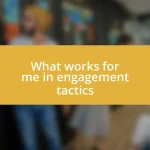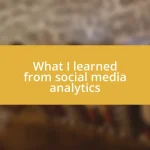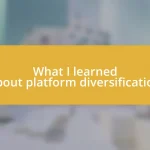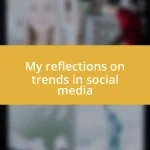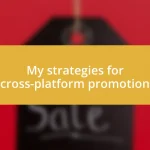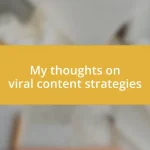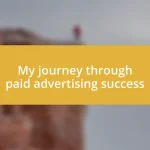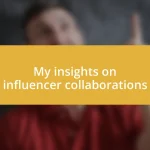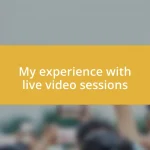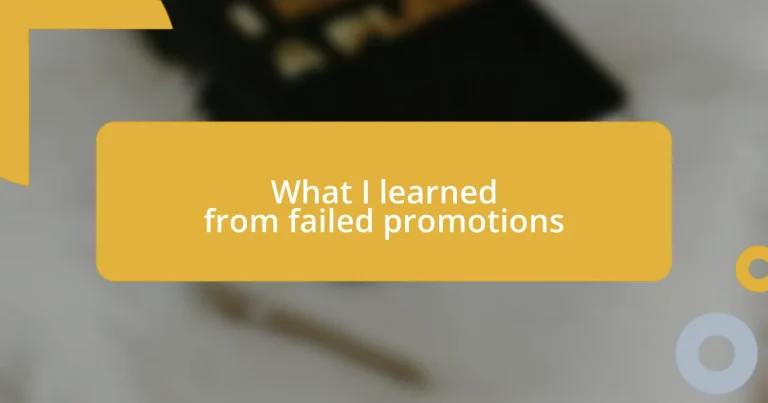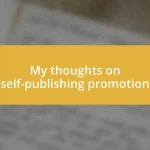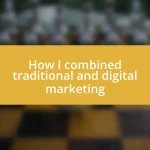Key takeaways not available due to an error.
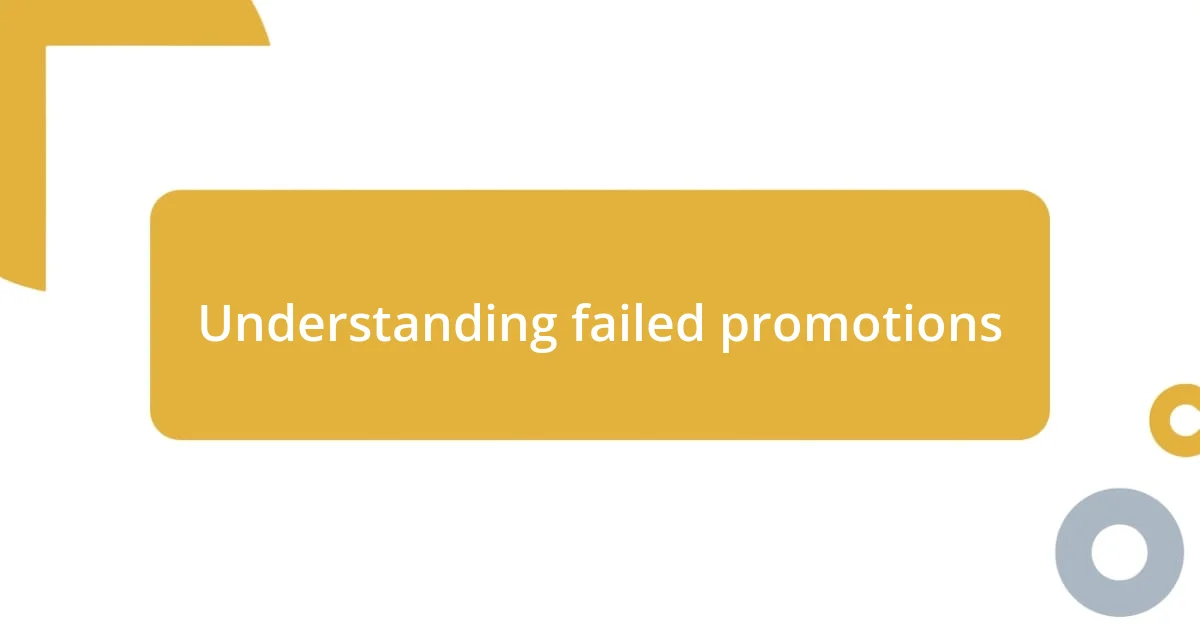
Understanding failed promotions
Failed promotions can often teach us more than our successes. I remember a time I launched a campaign that went flat—despite pouring my heart into it, the audience just didn’t connect. Have you ever experienced that sinking feeling when you realize your efforts missed the mark? It’s tough, but it’s also a valuable learning opportunity.
When we dig into why promotions fail, it’s easy to point fingers at external factors like market trends or competition. However, I’ve found that often the deeper issue lies in understanding the audience. Ask yourself: Did we truly listen to their needs? In one campaign I managed, we overlooked customer feedback, which turned out to be a critical mistake.
The emotional weight of a failed promotion can linger, making us second-guess our strategies. But it’s important to recognize that these setbacks aren’t the end of the road. In fact, they can fuel our growth. Each failure presents a chance to reflect and refine our approach. Isn’t that what we all strive for?
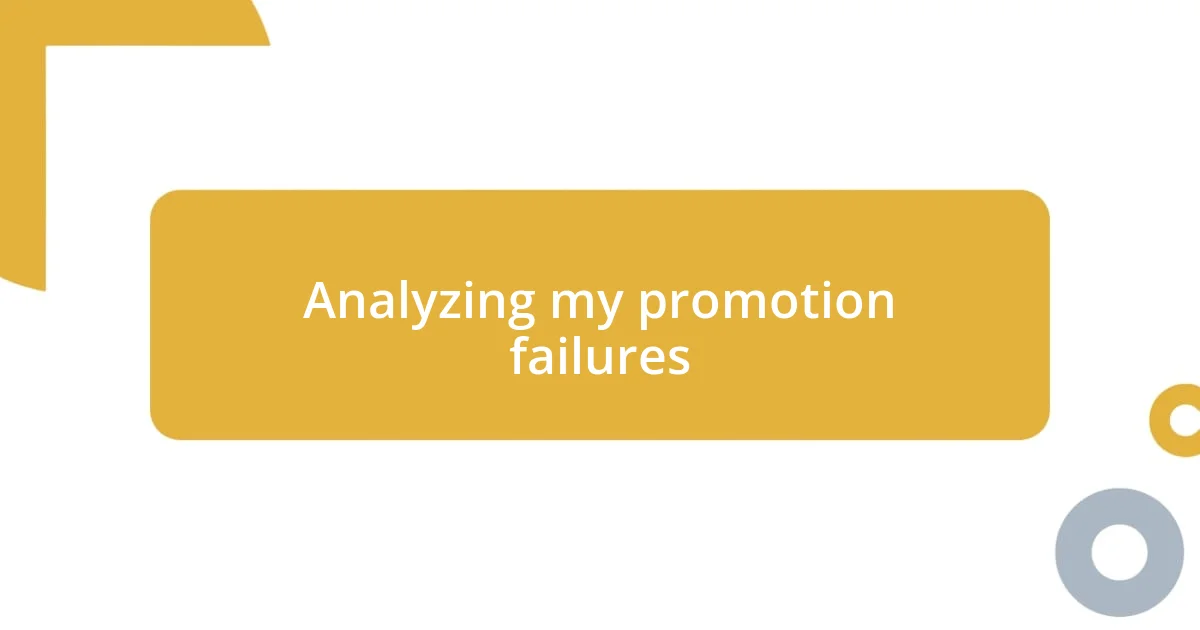
Analyzing my promotion failures
Trying to make sense of my promotion failures has been quite the journey. Each misstep feels like an emotional rollercoaster, but it has also revealed crucial insights. For example, I once ran a social media ad that I thought was creative and engaging. Instead, it fizzled out and barely got noticed. Looking back, I realize that while I was focused on the aesthetics, I completely missed the mark on targeting the right audience.
Here are some key takeaways from my experiences:
- Know Your Audience: My ads didn’t reflect the needs and interests of my target market.
- Feedback Matters: Ignoring customer feedback in the past led to misguided strategies.
- Test and Learn: I learned that having a fail-fast approach is essential; always test campaigns in smaller groups first.
- Adjust and Adapt: I’ve come to appreciate the importance of flexibility in responding to unforeseen challenges during a campaign.
- Embrace Vulnerability: Accepting that not every idea will translate is a humbling yet necessary lesson that fosters growth and resilience.
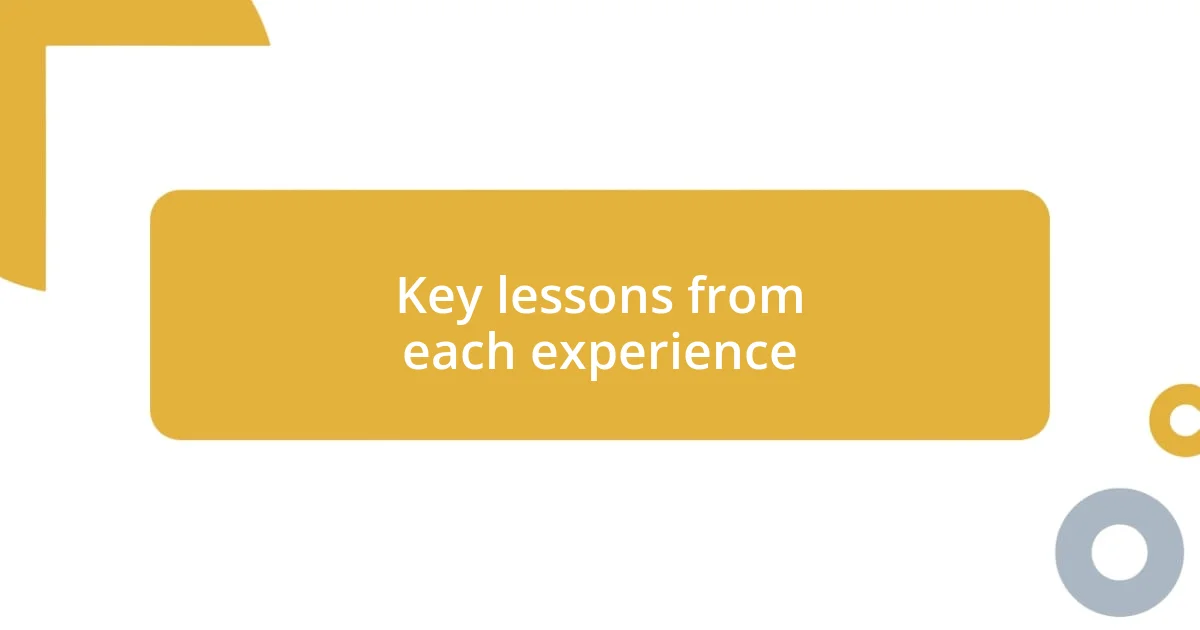
Key lessons from each experience
One of the most significant lessons I’ve learned from my failed promotions is the importance of truly comprehending the audience’s needs. A couple of years ago, I launched a campaign centered around a trendy product, convinced it would resonate. However, it fell flat because I hadn’t taken the time to engage with potential customers. It was a wake-up call for me to prioritize audience research over assumptions. Have you ever realized you were too far removed from your audience’s reality? It’s a humbling experience, pushing you to listen more closely.
Another key insight is the value of experimentation. I once ran a campaign that I believed would be a hit, only to see it underperform. In hindsight, the lack of A/B testing was glaring. I had no data to gauge what the audience preferred. Now, I always advocate starting with small test groups to gather vital feedback. This approach has not only improved my campaigns but also eased the anxiety of launching untested ideas. Isn’t it fascinating how much a little testing can change the outcome?
Lastly, I’ve learned to embrace vulnerability. I remember a time I launched a direct mail campaign that I thought was groundbreaking, only to realize it landed in the recycling bin. Feeling embarrassed and defeated was tough, but it ignited a desire to improve. This experience taught me that vulnerability can open doors to growth. I now approach new campaigns with an open mind, ready to learn from whatever outcome.
| Key Lessons | Personal Experiences |
|---|---|
| Know Your Audience | Launched a product-focused campaign that missed the mark due to lack of audience insights |
| Experiment and Test | Ignored A/B testing, leading to undiscovered audience preferences and poor performance |
| Embrace Vulnerability | Recalling a failed mail campaign that taught me the importance of growth through embarrassment |
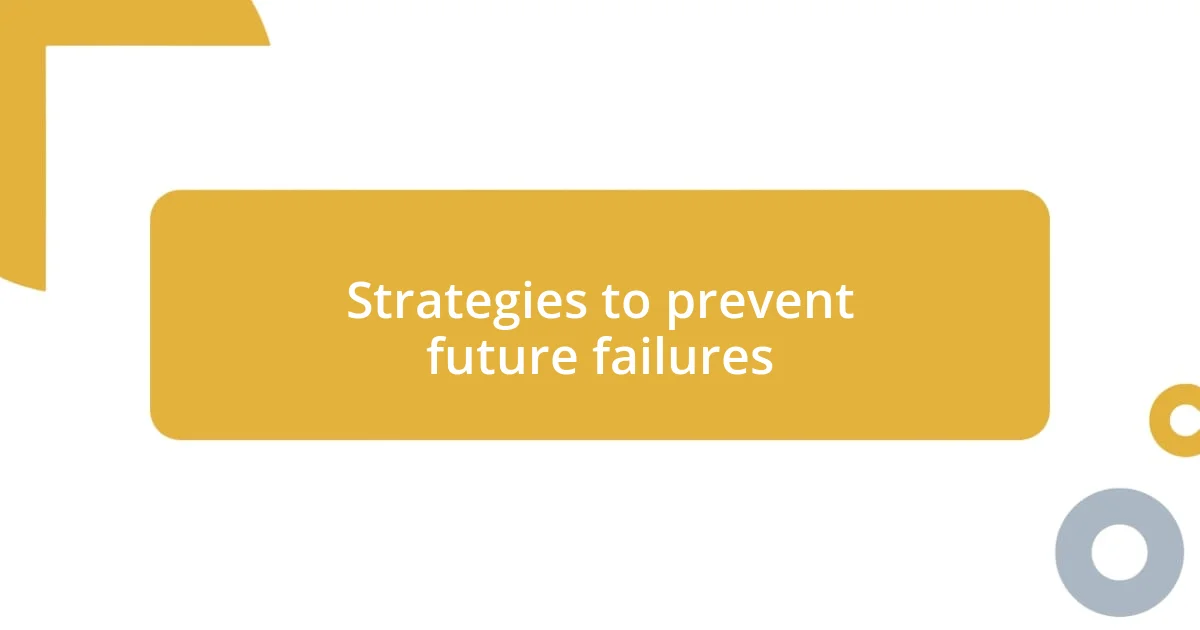
Strategies to prevent future failures
One strategy that has significantly transformed my approach is adopting a more rigorous audience analysis. I vividly recall a time when I launched a product without properly researching who would actually use it. It was all guesswork, and the results were disheartening. Now, I make it a point to conduct surveys and engage in social listening. Have you ever tried to understand your audience by just asking them what they want? It’s enlightening what you can learn when you actively seek their input.
Another vital strategy is implementing systematic testing throughout the campaign process. In one instance, I thought I had a winning idea for an email campaign, but without A/B testing, I was left in the dark. The campaign ended up being a flop, which felt like a punch to the gut. Since then, I’ve committed to testing different subject lines and content variations, all while keeping a close eye on the results. Isn’t it amazing how a small tweak can lead to more significant engagement?
Lastly, I’ve learned to pivot quickly when faced with unexpected challenges. I remember a time my promotional event was rained out, cascading into a series of unforeseen setbacks. Instead of dwelling on what went wrong, I embraced the situation, quickly adapting our online strategy to reach our audience virtually. I found that resilience not only reduces stress but also opens up new creative avenues for success. Have you ever had to turn a disaster into an opportunity? It’s not just about bouncing back; it’s about bouncing forward.
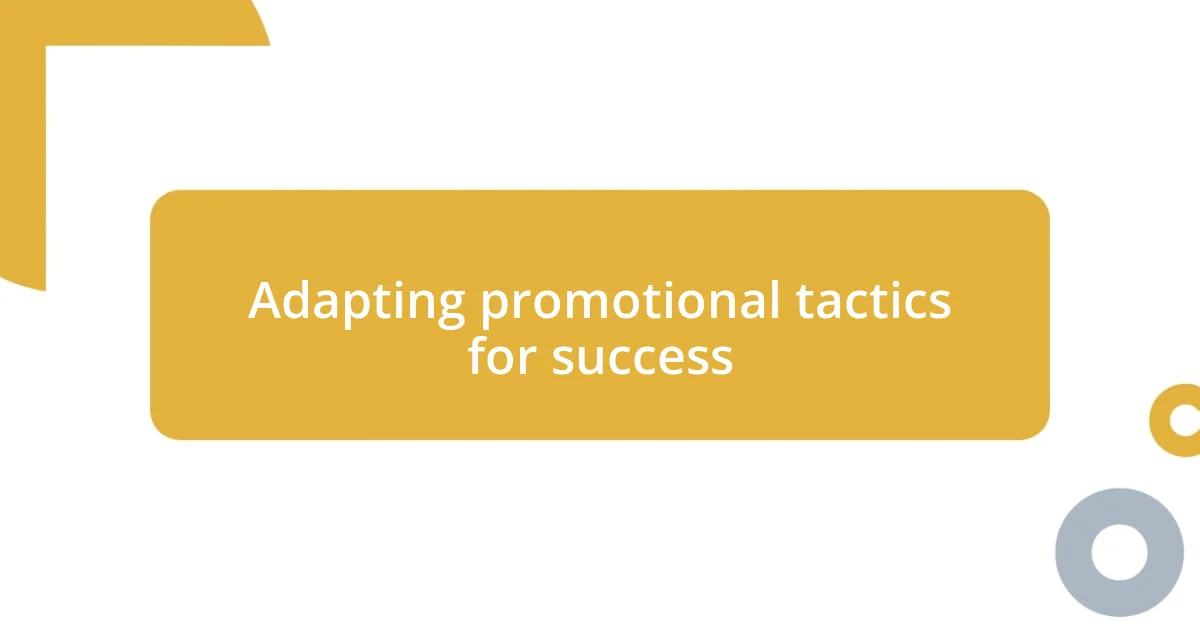
Adapting promotional tactics for success
Adapting my promotional tactics has often required me to broaden my perspective. I recall a time when I assumed a flashy social media campaign would draw in customers, only to realize that a more intimate, community-focused approach would have resonated better. The experience taught me the power of local engagement; instead of shouting across the internet, sometimes it’s about whispering in a friend’s ear. Have you ever changed your strategy based on a shift in context? That moment of enlightenment can redefine everything.
Feedback loops have become my best friends in adapting promotional tactics. After one particularly lackluster promotion, I sought input directly from customers. Their candid insights felt like a gut punch, yet it opened my eyes. I found that people appreciate being heard, and incorporating their suggestions not only improved future campaigns but also fostered a loyal community. Isn’t it rewarding to watch your audience feel valued? Listening can be your strongest promotional asset.
I’ve also learned to embrace flexibility within my promotional strategies. A few months back, I found myself launching a campaign during a major holiday. Instead of sticking to my original plans, I pivoted in response to emerging trends and customer behaviors. The result? A campaign that felt timely and relevant, which, unexpectedly, led to a significant increase in engagement. Isn’t it amazing how being adaptable can transform setbacks into stunning successes? Each experience has deepened my understanding that sometimes the best promotional tactics grow organically from the landscape around us.
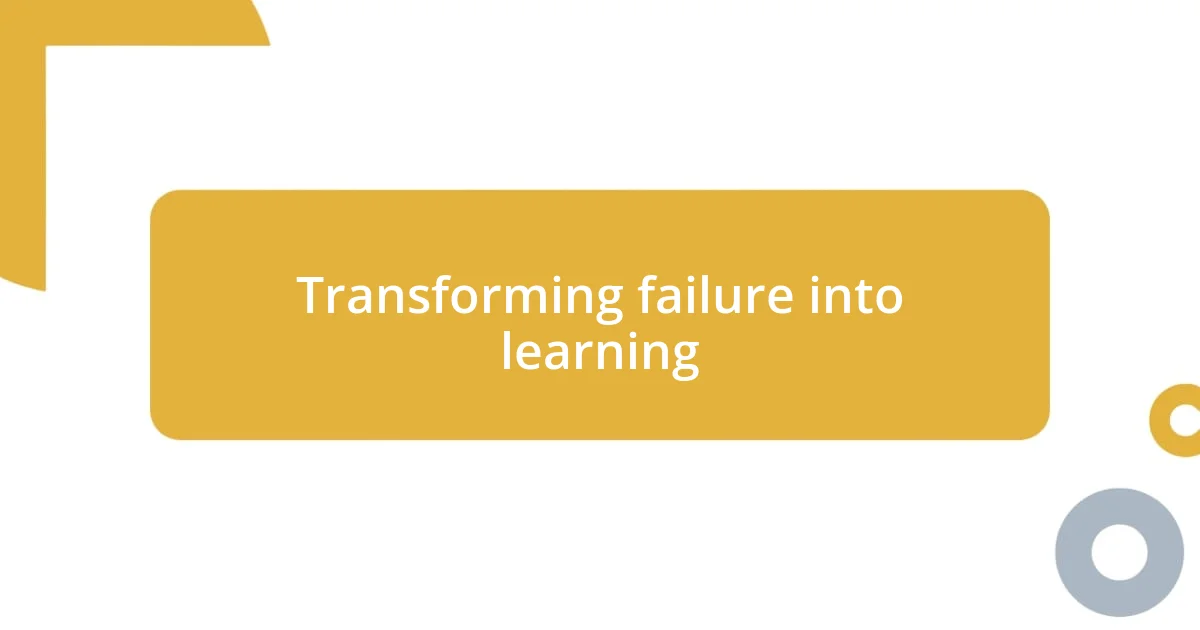
Transforming failure into learning
Transforming failure into learning is an intriguing journey, one I’ve traveled on more than a few occasions. I remember a failed promotion where I let my excitement overshadow the essentials—like timing and messaging. It was like hosting a party no one wanted to attend. That moment taught me a profound lesson: each setback is an opportunity to reevaluate and refine my approach. Have you ever had a moment where you thought, “What was I thinking?” It’s those realizations that can really motivate growth.
I’ve also discovered that embracing vulnerability can be a true asset in this process. One time, I shared the story of a dismal campaign failure with my team, and their response was heartwarming. They opened up about their own past flops, leading to a remarkable bonding moment where we brainstormed collectively for improvement. I learned that by admitting our mistakes, we not only grow individually but also strengthen our teams. Isn’t it fascinating how shared experiences can foster creativity?
Moreover, I find that reflecting on what went wrong helps to clarify what needs to change moving forward. After a particularly tough promotional experience, I took a step back to analyze all the moving parts. I asked myself questions like—what assumptions did I make? What could I have done differently? It was enlightening to piece together the puzzle. This kind of reflection doesn’t just enhance future promotions; it also instills a sense of empowerment. When was the last time a setback gave you the power to push through? Engaging in this reflective practice transformed my failures into stepping stones, proving that learning can emerge from even the most challenging circumstances.
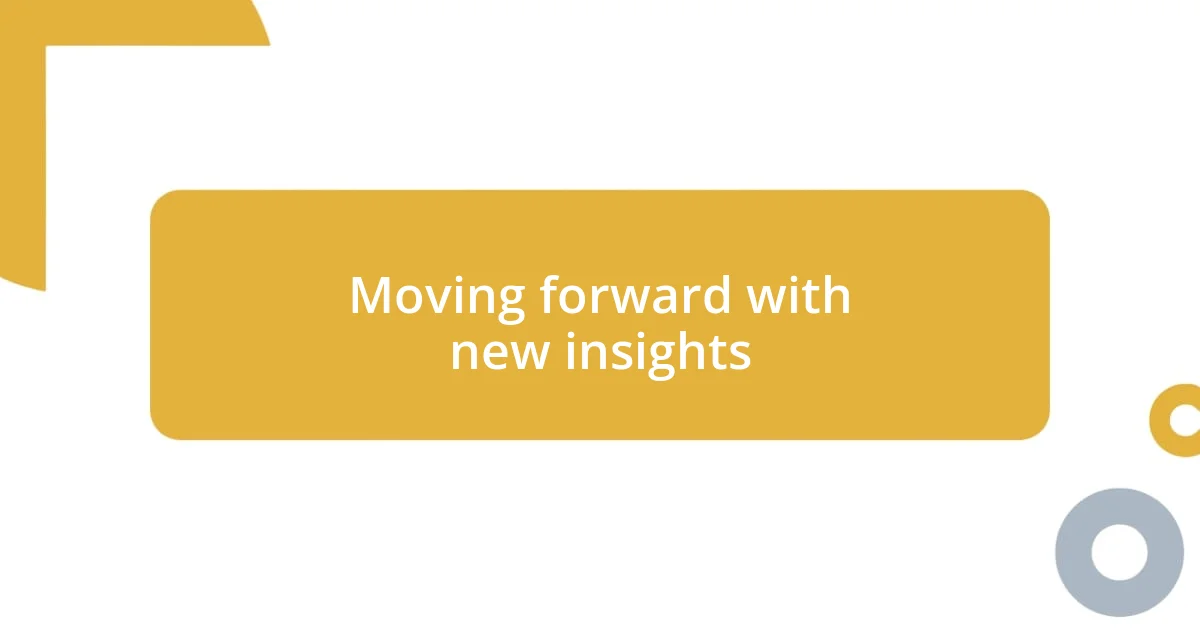
Moving forward with new insights
Moving forward with new insights requires a blend of reflection and action. I vividly recall a time when a promotion fell flat due to my oversight in audience targeting. I had assumed everyone would relate to my theme, but it turned out I missed the mark completely. The moment I finally grasped the importance of understanding my audience’s specific interests, it was like a light bulb turned on. Have you ever had an epiphany that made you rethink everything? That realization became a cornerstone for my future campaigns, reminding me to always keep my audience at the forefront.
As I began to embrace a more data-driven approach, I realized the importance of metrics in shaping effective promotions. One campaign analysis revealed that a surprising percentage of my audience preferred video content over static images. I never would have guessed! Adjusting my strategy based on this fresh insight not only increased engagement but gave me a newfound appreciation for the power of analytics. Isn’t it incredible how numbers can guide creative decisions? This insight steered me toward more successful promotional paths, reinforcing the idea that data can indeed be a storyteller.
I’ve also come to appreciate the value of collaboration in moving forward. It’s often easy to operate in a vacuum, but I learned the hard way that bouncing ideas off colleagues can unveil hidden gems. During a brainstorming session, I shared my frustrations about a stalled campaign, and a colleague suggested a simple tweak that transformed the entire promotion. The exhilaration of watching that new approach take off was a testament to the magic that happens when you invite others into the process. Have you ever found unexpected solutions through teamwork? I’ve realized that fostering collaborative environments not only enriches my strategies but also cultivates a sense of community among my peers.

